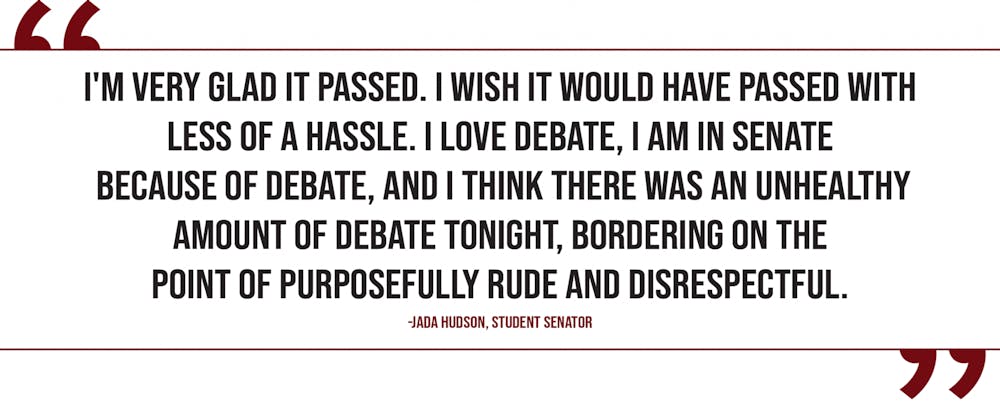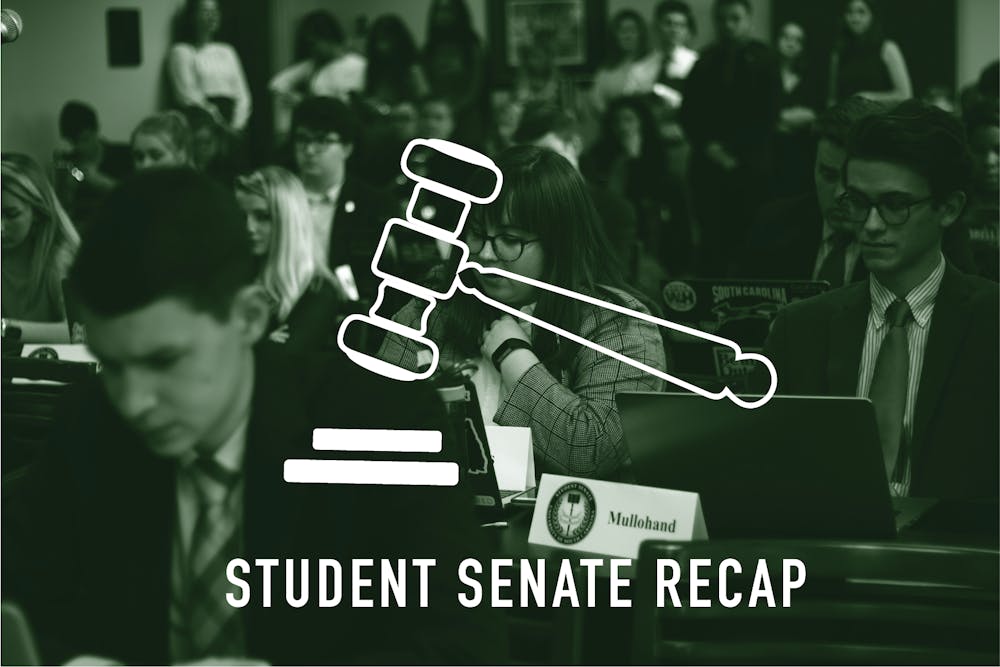The student senate overrode Student Body President Reedy Newton’s veto of a bill that caps campaign spending for Student Government candidates on Wednesday. The senate did not challenge Newton's other veto of a bill that would allow the senate to go into executive session for debate about candidates for appointed Student Government positions.
Newton said she is strongly in favor of campaign finance reform as a whole, outside of her concerns with this bill.
“I worked two jobs in order to support my own campaign and fund myself. I didn’t accept large donations. I didn't accept third-party donations. In fact, I turned all of them down because I believe that Student Government is supposed to serve the students,” Newton said.
Her main concerns with the bill were that the additional amount candidates would be allowed to spend in a runoff was too low and that capping how much a campaign can spend would encourage third-party participation in elections.
“I think this could potentially encourage the ability of third-party activists or political organizations to permeate our elections process. This would be so dangerous and unhealthy for our non-partisan organization as we had no legislation around in-kind donations (the donation of goods and services instead of money) or third parties,” a communication from Newton to the student senate said.
Newton also said that she would support a cap on how big donations can be as a form of campaign finance reform.
Student senators Jada Hudson and Aden Lloyd, the sponsors of the bill, called for the override vote. In order to override a presidential veto, two-thirds of the senate must vote in favor of the override. When the legislation initially passed, 33 senators voted for it, and five were against it.
After a period of debate, the student senate overrode the veto with a vote of 28-7, surpassing the two-thirds threshold.
“I'm very glad it passed. I wish it would have passed with less of a hassle. I love debate, I am in senate because of debate, and I think there was an unhealthy amount of debate tonight, bordering on the point of purposefully rude and disrespectful,” Hudson said.

One potential concern that could have jeopardized the veto was that the legislation would be pushed through too close to the next election.
“When we think about the ideals of Student Government and transparency, and what it looks like to have elections that really account for all students, while these guidelines are completely something that contributes to that environment, I fear we're shooting ourselves in the foot by the very act of making this happen less than a week before the mandatory candidates meeting,” Ian Herd, who sponsored an amendment to the bill and supports its content, said.
However, the Student Government codes allow for the passage of bills that will impact the upcoming election season through Feb. 1.
For Hudson, final passage of the bill was the culmination of an idea from her first run for 113th student senate in 2021.
“I've been researching, planning and working on this ever since then, almost two years now at this point. This bill is very near and dear to my heart and means a lot to me because when I first came here, first saw how the elections are run, I said, 'This is a little odd. People are spending exorbitant amounts of money,'" Hudson said. "It's not fair to students who are of a lower socioeconomic class, because they can't spend that money.”
The bill originally passed Jan. 18, though it became unclear how long Newton had to sign or veto the legislation, as the Student Government codes and constitution gave different timelines. After meeting with Speaker of the student senate Natalie Trimble and Attorney General for the Student Government Emmeline Basco, Newton entered into a good faith agreement to sign or veto the bill by 2 p.m. on Jan. 26.
Wednesday night, the student senate passed a bill amending the Student Government codes to mirror the constitution's language on the topic. If Newton signs the bill, she and her successors will have 10 calendar days, as is currently in the constitution, to sign or veto bills.
Newton also vetoed a second bill, which would have allowed for the student senate to enter into executive session to debate candidates for appointed positions. In an executive session, the public, including media, is removed from the senate chambers and the livestream is cut off.
“It is our duty to ensure that in all our efforts, we are transparent with the student body, including discussions happening in our meetings. Allowing for an executive session would create closed doors and lack of transparency within the student body,” a communication from Newton to the student senate said.
Upon hearing Newton’s concerns before the senate session, the bill’s sponsor, Sean Deuty, agreed with her reasoning and did not call for a veto override vote.

